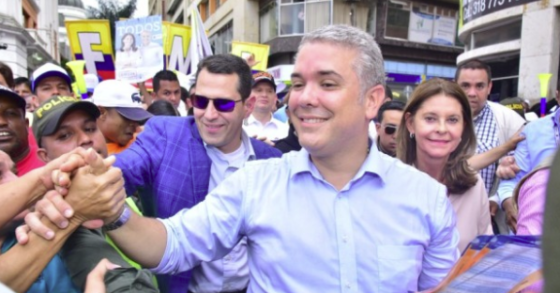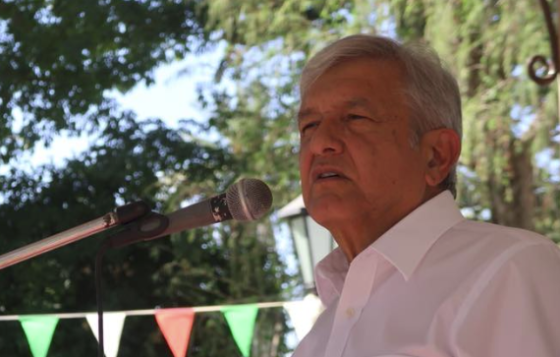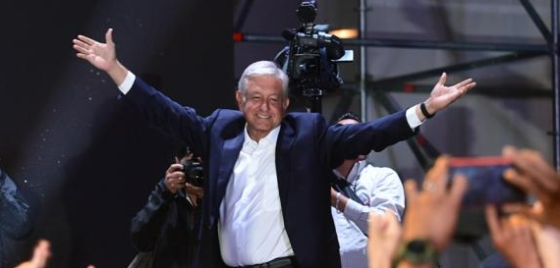
Will Colombia’s New President Deliver on His Promises?
Iván Duque, a conservative former senator, on Sunday won Colombia’s presidential runoff election. What does it mean for the country?
A Daily Publication of The Dialogue
The coronavirus pandemic will accelerate changes in international relations that the world had already been experiencing, Richard Haass, the president of the Council on Foreign Relations, wrote in Foreign Affairs earlier this month, highlighting “waning American leadership” and “faltering global cooperation.” To what extent will Covid-19 result in a more deglobalized world, and how would Latin American and Caribbean countries figure into this new international scenario? Will coronavirus bring stronger isolationism and economic nationalism to the region, and what would this mean for the future of trade relations? Will the post-coronavirus world see a significant shift away from multilateralism, and which countries in Latin America and the Caribbean would stand to gain or lose the most in this context?
Kenneth Maxwell, founding director of the Brazil studies program at Harvard University’s David Rockefeller Center for Latin American Studies: “The pandemic will have a profound impact on Latin America, not only on the political, social and economic cohesion of the region’s major countries, but also on Latin America’s international relations. Some consequences are already evident: The flight of foreign capital, especially from Brazil and Mexico; the willful blindness of populist leaders of both of these countries in recognizing the scope and virulence of the pandemic and their failure to take swift actions to curb the spread of the disease; the vulnerability of Brazil and Mexico to the collapse of oil prices; and the aggravation of already dire social inequalities, putting enormous pressure on weak public health systems in Latin America, meaning that the pandemic is already disproportionately affecting the poor. Coronavirus deaths in Guayaquil and Manaus are already out of control. (So much for the idea that ‘hot weather’ will mitigate the spread of Covid-19.) The long-term damage of economic shutdowns in Europe and North America, and the complexities and timing of resuming economic activity, make it likely that recuperation will be long and problematic. A recession, even a depression, could follow. Certainly, economic growth will collapse in the major world economies, at least in the short term, and huge public debt will have been assumed. So much more will be the case in Latin America. Tourism, so critical in the Caribbean, will take years to return to the levels of the past decade. As to the role of the United States in the region, China is now and will continue to be a major competitor. China will continue to need Brazilian and Argentine soya and pork, and cash-rich China will continue to aggressively gobble up Latin American utilities, as well as port, rail and telecommunications infrastructure. In Latin America, the United States will remain trapped by its largely domestically (and Florida) generated obsession with Cuba and Venezuela. The Post-WWII ‘world order’ and its American inspired multilateral institutions are in disarray, attacked and undermined by their very creators. The immediate prospects for Latin America are not encouraging.”
Isabel de Saint Malo, former vice president of Panama: “The world is confronting a decisive crisis in history. Unforeseen political, economic, social and humanitarian challenges coincide with unprecedented opportunities to install a new narrative and reconstruct into the economy of the future. For decades, we have been discussing the necessity of disruptive measures to tackle the climate crisis and human development, but we have been unable to make it happen. While the world is in emergency mode, working on safeguarding lives and livelihoods, we must not lose sight of the possibility for reconstruction to be disruptive in favor of sustainable development and inclusion, reimagining the future. For this region, that means improving education so that in a new emergency, home schooling is not a luxury reserved for a few; health, to ensure universal services; and technology, to bridge the digital divide. This requires resources that can be found through more efficient and effective bureaucracies and processes. The region can no longer ignore the serious backwardness of its institutions. Leadership is needed to spearhead the transformations the region has envisioned for a long time. Global collaboration is necessary in this path, as isolationism and nationalism will not solve the crisis. In the current context, countries’ national interests are better served with collaboration. Latin America and the Caribbean prior to Covid-19 faced challenges in terms of governance; perhaps this crisis will bring about the leadership required for building a better future. If we fail, the alternative will be the deepening of what the region had before. The alternative will not be a return to normal; but rather, worse, with increased poverty and exclusion, risking further cracks on trust in public institutions and even democracy. Leadership is thus urgent, to push for the long-awaited transformation.”
Rebecca Bill Chavez, nonresident senior fellow with the Peter D. Bell Rule of Law program at the Inter-American Dialogue and former U.S. deputy assistant secretary of defense for Western Hemisphere affairs (2013-2017): “The coronavirus pandemic has accelerated important global geopolitical trends of the past three years. In the context of Latin America and the Caribbean, waning U.S. leadership has become even more apparent, leaving fertile ground for China to up its game by deftly using medical diplomacy to fill the vacuum and to strengthen ties with the region. China is filling critical gaps in medical equipment and sharing technical expertise with countries from Mexico to Argentina. In the meantime, the Trump administration announced its intent to defund the Pan American Health Organization, the very body that is designed to prevent and eliminate communicable diseases. In addition to providing much-needed humanitarian assistance to the region, there are other steps that the United States can and should take. When it comes to countering Chinese influence in the region, the current U.S. strategy boils down to threatening language intended to force our partners to choose between the United States and China without offering alternatives. Instead, the United States should pursue constructive engagement in areas of shared interest, including the coming humanitarian crisis in the region caused by the spread of Covid-19.”
José Antonio Ocampo, director of the Economic and Political Development Concentration at the School of International and Public Affairs at Columbia University, chair of the U.N. Committee for Development Policy and former Colombian finance minister: “Multilateralism has been experiencing a major crisis in recent years. A fresh case was the lack of leadership of the G-20 during the recent spring meetings of the Bretton Woods institutions. The weak statement and decisions endorsed sharply contrast with the major agenda that the G-20 adopted in London in April 2009 to respond to the global financial crisis. The U.S. withdrawal of funding to the World Health Organization is another major shock. The Covid-19 crisis has brought major new challenges. The most important is overcoming the pandemic itself, which will continue to be a major issue on the global agenda for several years. In turn, the dramatic economic crisis it has generated has unleashed new challenges, notably promoting a worldwide recovery with strong employment creation. Financial support for emerging and developing countries will be critical in that regard, in the face of the worst outflow of portfolio capital they have ever experienced, and the debt crises that several of them will face. The reconstruction of international trade will also be a major challenge, due to the destruction of value chains and the collapse of commodity markets. International migration will face even greater obstacles. Latin America stands to lose from the weakening of global cooperation, and it should stand together in support of renewed multilateralism. It should also strengthen its own integration processes. We must overcome our political differences to unite in the fight to strengthen global and regional cooperation.”
 The Latin America Advisor features Q&A from leaders in politics, economics, and finance every business day. It is available to members of the Dialogue’s Corporate Program and others by subscription.
The Latin America Advisor features Q&A from leaders in politics, economics, and finance every business day. It is available to members of the Dialogue’s Corporate Program and others by subscription.
Iván Duque, a conservative former senator, on Sunday won Colombia’s presidential runoff election. What does it mean for the country?
Mexicans go to the polls on Sunday, July 1, for the country’s presidential, legislative and local elections. What can we expect?
Leftist Andrés Manuel López Obrador swept to victory Sunday in Mexico. What changes are in store?
 Image: NASA
Image: NASA

